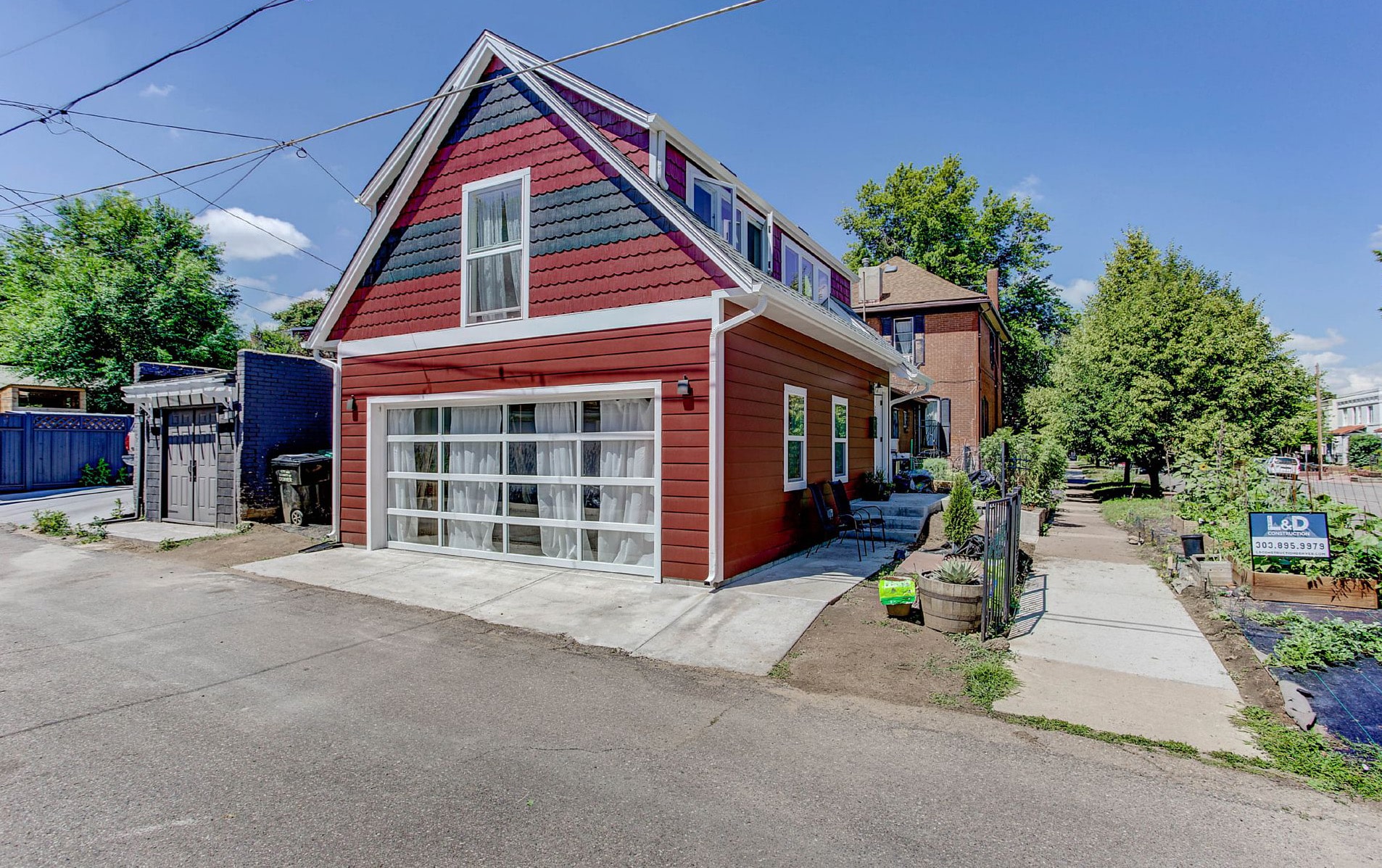
Shown is an accessory dwelling unit that was constructed in 2018 at 2558 N. Marion St. (BusinessDen file)
Accessory dwelling units are becoming a big topic in Denver’s residential planning process.
At the same time the Denver City Council is rezoning certain neighborhoods to allow for ADUs, a new advisory committee is rethinking the city’s one-size-fits-all approach to what they can look like.
Joshua Palmeri, a Denver city planner, said that with an increasing rate of ADU permit applications, the city must remove what he called barriers to allow for more creative concepts and flexible regulations to provide more housing options and availability.
That includes potentially having different design standards for different neighborhoods.
“We’re getting phone calls, say like in Wellshire, they’ll want to do an ADU,” Palmeri said. “But right now, the building standards are the same citywide and we haven’t quite tuned them.”
For example, detached ADUs are limited to 24 feet tall. That could change for certain areas as part of the process.
The advisory committee is made up of City Council members, architects, planners and neighborhood representatives, and kicked off discussions last week. The committee is planning to bring a set of proposals to the council for consideration by spring 2023.
Palmeri said the city has seen an increase in ADU applications particularly in what’s identified as Denver’s suburban residential areas. He said the city wants to make sure before it approves an ADU that it fits within the “neighborhood character.”
“Many of Denver’s older neighborhoods don’t have the housing options that folks are looking for nowadays,” Palmeri said. “There’s a lot of just two-, three-, four-bedroom homes. In Montbello, for example, it’s really hard to find just a one-bedroom dwelling unit.”
As BusinessDen previously reported, there were 227 ADUs completed between 2016 and November 2021 in Denver.
In recent months, the City Council has rezoned certain neighborhoods, like East Colfax and Sloan’s Lake, to allow for ADUs. Property owners in neighborhoods that don’t currently allow ADUs can ask the city to rezone their specific properties.
ADUs are only allowed to be built on single-unit lots, but part of the Blueprint Denver plan, which the committee is using as a guide, is to examine whether there could be more flexibility in those rules, like for townhomes that have a backyard.
ADUs can’t be sold separately from a main home, but can be rented out for long-term tenants or short-term users like Airbnb guests. Denver has advertised them as places for elderly relatives or post-college graduates to live, or as additional miscellaneous space.
“I think COVID kind of built more interest for working from home, and everybody is looking for new ways to sort of feel comfortable,” Palmeri said.

Shown is an accessory dwelling unit that was constructed in 2018 at 2558 N. Marion St. (BusinessDen file)
Accessory dwelling units are becoming a big topic in Denver’s residential planning process.
At the same time the Denver City Council is rezoning certain neighborhoods to allow for ADUs, a new advisory committee is rethinking the city’s one-size-fits-all approach to what they can look like.
Joshua Palmeri, a Denver city planner, said that with an increasing rate of ADU permit applications, the city must remove what he called barriers to allow for more creative concepts and flexible regulations to provide more housing options and availability.
That includes potentially having different design standards for different neighborhoods.
“We’re getting phone calls, say like in Wellshire, they’ll want to do an ADU,” Palmeri said. “But right now, the building standards are the same citywide and we haven’t quite tuned them.”
For example, detached ADUs are limited to 24 feet tall. That could change for certain areas as part of the process.
The advisory committee is made up of City Council members, architects, planners and neighborhood representatives, and kicked off discussions last week. The committee is planning to bring a set of proposals to the council for consideration by spring 2023.
Palmeri said the city has seen an increase in ADU applications particularly in what’s identified as Denver’s suburban residential areas. He said the city wants to make sure before it approves an ADU that it fits within the “neighborhood character.”
“Many of Denver’s older neighborhoods don’t have the housing options that folks are looking for nowadays,” Palmeri said. “There’s a lot of just two-, three-, four-bedroom homes. In Montbello, for example, it’s really hard to find just a one-bedroom dwelling unit.”
As BusinessDen previously reported, there were 227 ADUs completed between 2016 and November 2021 in Denver.
In recent months, the City Council has rezoned certain neighborhoods, like East Colfax and Sloan’s Lake, to allow for ADUs. Property owners in neighborhoods that don’t currently allow ADUs can ask the city to rezone their specific properties.
ADUs are only allowed to be built on single-unit lots, but part of the Blueprint Denver plan, which the committee is using as a guide, is to examine whether there could be more flexibility in those rules, like for townhomes that have a backyard.
ADUs can’t be sold separately from a main home, but can be rented out for long-term tenants or short-term users like Airbnb guests. Denver has advertised them as places for elderly relatives or post-college graduates to live, or as additional miscellaneous space.
“I think COVID kind of built more interest for working from home, and everybody is looking for new ways to sort of feel comfortable,” Palmeri said.
